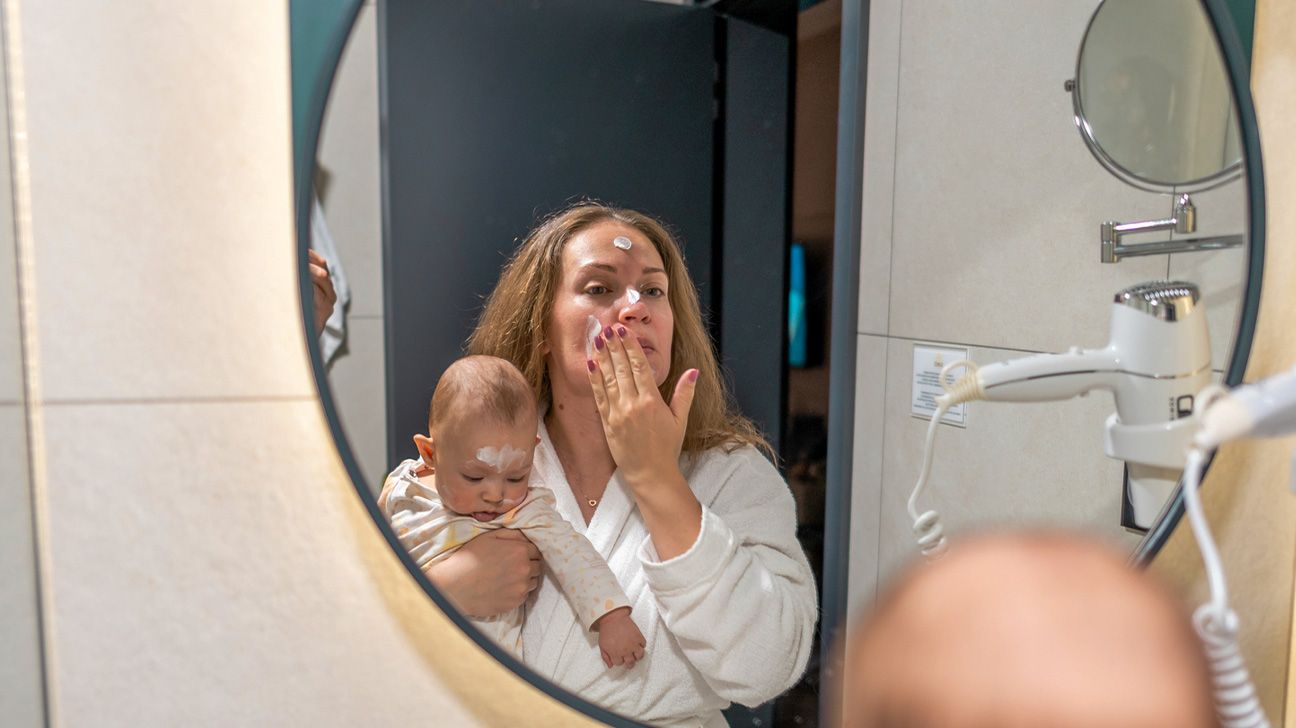If you’re newly postpartum, your skin might be the last thought on your mind — but you might notice puffiness and redness or discoloration. Hormonal changes can make your skin flare up, but treatment can help.

For some people, post-pregnancy may be a time when rosacea occurs for the first time or even comes back.
Rosacea is an inflammatory condition that causes facial redness or discoloration, pus-filled bumps, and other symptoms. While its exact cause isn’t known, experts think hormonal changes might be a cause.
This article explains the link between pregnancy and rosacea. It also mentions treatment and management options that may be safe for you to use during pregnancy and breastfeeding or chestfeeding.
Experts don’t know the exact cause of rosacea. Research into rosacea during and after pregnancy is also lacking, so it can be hard to pinpoint why your skin flares up.
However, research does show that the hormonal changes of pregnancy may play a role. A 2015 study found a significant connection between female hormone imbalance and rosacea flare-ups.
A 2017 research review shared that data on how pregnancy affects acne and rosacea is lacking. Despite this, the review showed that acne and rosacea often flared up during pregnancy in people who already had the conditions. The conditions could also happen to you for the first time during pregnancy, but this is rare.
So, why do hormones affect your skin? When you’re pregnant, female hormones like estrogen, progesterone, and human chorionic gonadotropin (hCG) are in flux. These changes can make your skin more oily and dry or increase your acne risk. You might also have eczema or rosacea flare-ups.
When pregnancy stops, your hormones continue to shift and change. It can take several months for them to return to your typical prepregnancy levels.
It’s important to note that the hormonal shifts associated with pregnancy can cause rosacea, no matter when your pregnancy ends.
Pregnancy and post-pregnancy aren’t the only times when hormonal rosacea may occur.
According to a large 2021 study involving white women in the United States, rosacea might happen due to the monthly hormonal changes associated with ovulation and menstruation.
During the first half of your menstrual cycle, estrogen is at its highest. This means your skin might look clear and glowy and be less likely to get flare-ups.
In the second half, estrogen decreases and progesterone increases. This might explain skin conditions like acne, rosacea, and eczema.
The 2021 study above also found that postmenopausal people were less likely to get rosacea than premenopausal people. The only exception to this was when they were getting hormone replacement therapy. The study’s authors theorized that low estrogen explained this change.
It’s important to note, however, that menopausal hot flashes sometimes link to rosacea flare-ups. These may be more likely to occur during perimenopause, the time before menopause.
You can reduce your symptoms by avoiding rosacea triggers. These vary from person to person. Some triggers to avoid can include:
- drinking hot beverages like coffee, tea, and hot chocolate
- eating spicy foods
- consuming alcohol
- exposing yourself to windy conditions, the sun, and hot or cold outdoor temperatures
- doing strenuous exercise
If avoiding triggers doesn’t work for you, talk with your healthcare professional.
Currently, Zithromax (azithromycin) is the only oral drug experts consider safe to take during pregnancy for rosacea.
Experts don’t consider other medications routinely used for rosacea safe during pregnancy and breastfeeding or chestfeeding, including the topical medications Mirvaso (brimonidine) and Rhofade (oxymetazoline).
Certain skin conditions
Skin conditions that look similar to rosacea include:
Rosacea is an inflammatory skin condition of the face. The hormonal changes caused by pregnancy and post-pregnancy may cause or worsen rosacea.
While the exact cause isn’t known, experts think environmental and hereditary factors might play a role.

